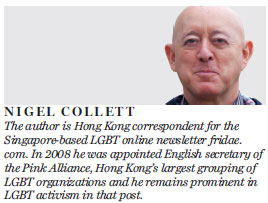Business embraces LGBT equality
Updated: 2015-03-10 07:48
By Nigel Collett(HK Edition)
|
|||||||
The media has recently reported that a few HSBC shareholders, who object to any form of equality for the small number of our lesbian, gay, bisexual and transgender (LGBT) citizens, are attacking the bank's inclusion of good diversity practices in its operations. It seems these opponents of social reform have finally woken up to the fact that business is now moving well ahead of government and law in Hong Kong and is now beginning to look after all, rather than the majority, of their employees. Those who don't like this are threatening to cash in their shares and withdraw their funds.
Despite the fact that it would be heartwarming to the rest of us to see these opponents of fair play shooting themselves in the foot, one really has to persuade such people that they are on a hiding to nothing. Business's ship has already sailed, leaving those who don't want to be on board gnashing their teeth at the quayside. HSBC in particular decided many years ago that there was more money to be made in giving equality to their LGBT employees than in continuing to force them to stay in the closet. For something like 10 percent of their workforce is LGBT, and treating them fairly allows them to perform to their fullest potential.
The logic of this is inexorable, and leads directly to an institution like HSBC demanding that its suppliers and contractors implement diversity policies similar to its own. Why would any corporation want to work with firms of which 10 percent of their workforce is operating at 30-40 percent below capacity?
International conglomerates have for many years been taking advantage of giving their LGBT employees similar rights and support in coming out - basically treating them fairly like the other employees - and are now introducing this best practice to Hong Kong. The banks have led the way, both individually and jointly in their LGBT Interbank Forum. In the last two years, HSBC Main Building has several times been lit up in rainbow colors, and this year the bank hosted the annual Out on the Street conference which Todd Sears brought to Hong Kong from Wall Street. This brought together a stellar cast of senior executives from the financial and other sectors, all of whom are supportive of equal treatment for their LGBT employees. The banks are now openly acting as major sponsors of LGBT events in Hong Kong.
Finance has been followed in this by the legal profession. Two years ago, Gay and Lesbian Attorneys (GALA) was formed to link the diversity organizations in legal firms in Hong Kong, and to lend legal advice and support to the struggle to expand LGBT equality. Most recent of all, Ernst & Young has become the first of the big four in the accountancy and business consultancy world to introduce a diversity organization for their employees here. Their unity organization was launched in Hong Kong by their regional managing partner just a few weeks ago.
It will soon be possible to measure the steady spread of good diversity practices in Hong Kong. The NGO Community Business is launching Asia's first ever LGBT Workplace Inclusion Index. Modeled on indexes in the US and Europe, this assesses a company's diversity practices against a range of 8 categories, including equal opportunity policies, diversity training and structures, and corporate culture. Some 31 companies have signed up for this at the time of going to press, and more are expected to do so by the closing date of Feb 27. Results will be announced at an awards ceremony on May 15, when we shall learn the top 10 companies in diversity practices in Hong Kong. Experience elsewhere has shown that the introduction of such published indexes inevitably leads to competition among corporations seeking to be rated at or near the top. The index will be a highly effective tool for expanding the rights and working conditions of Hong Kong employees.
Even the World Bank has adopted several social and environmental safeguard polices that "condition" its funds on certain procedures that both it and borrowers must follow in treating LGBT minorities. These policies have been replicated at nearly all development institutions and are essential in preventing harm and providing opportunities for affected minority communities to engage in the development process and share in its benefits.
Where does all this leave those who want to resist this tide? It leaves them taking water, rather like King Canute sitting on the beach, telling the waves to stop.

(HK Edition 03/10/2015 page11)